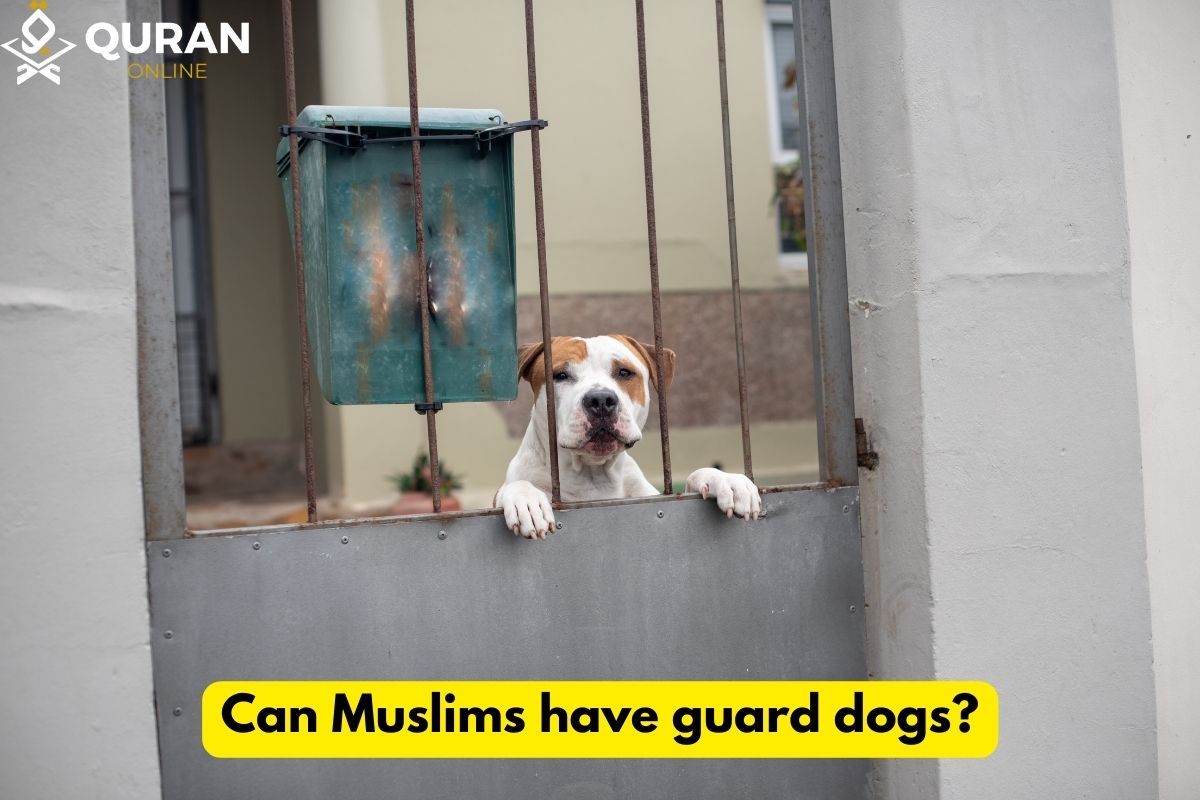As Muslims we know that keeping a dog is Haram, but what about having a dog for protection? That’s what we will find out in this article.
Is it haram to have a dog for protection? No, it’s not haram to keep a dog for protection, as the Prophet (peace and blessing be upon him) stated that keeping dogs is only allowed for farming or herding livestock. Otherwise, good deeds will decrease by one Qeeraat every day. You should also make a separate place for the dog.
If you want to know the ruling of having a dog, if touching a dog breaks the wudu or not and more then let’s get started.
Is having a guard dog permissible in Islam?
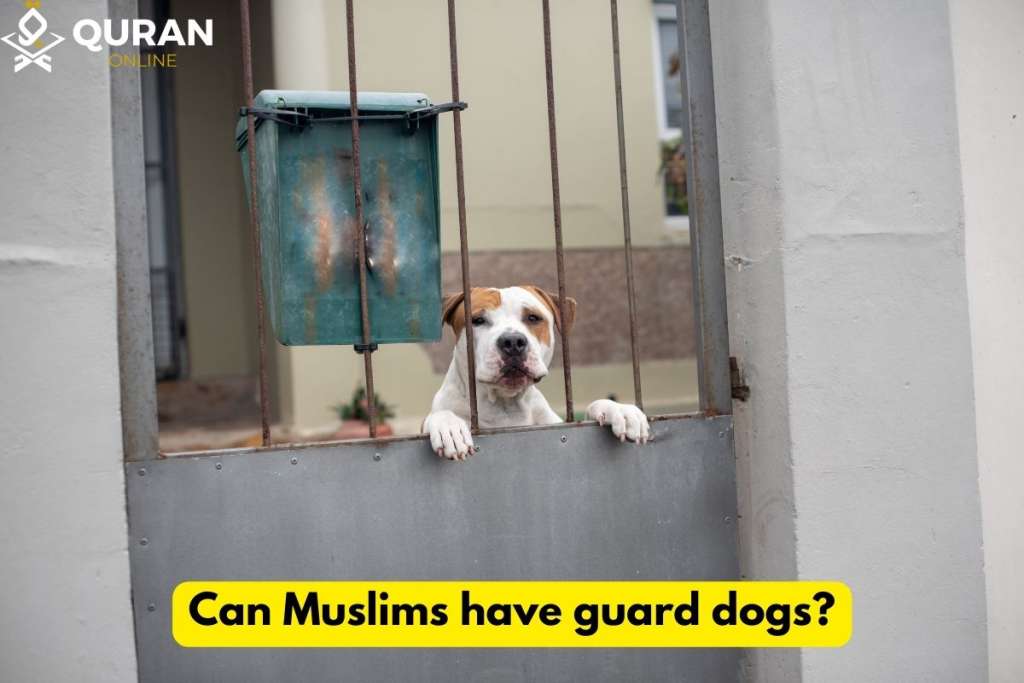
Yes, it’s permissible to keep a dog for protection. However, you shouldn’t let them in the house, instead, you should make a separate space for the dog.
The prophet (peace and blessings be upon him) said:
“Whoever keeps a dog, his reward for good deeds will decrease by one Qeeraat every day, except dogs used for farming or herding livestock.”
[Narrated by al-Bukhaari, 2322.]
From this hadith, we understand that keeping a dog for fun or as a pet is not permissible. We’re only allowed to keep them for farming or herding livestock, which are used for guarding and protection.
Muslim narrated the hadith as follows:
“Whoever keeps a dog, except a dog for hunting or herding livestock, his reward will be decreased by two Qeeraats every day.”
Ibn ‘Abd al-Barr said: This hadeeth shows that it is permissible to keep a dog for hunting and herding livestock, and also for farming.
When the prophet (peace and blessings be upon him) was asked about the meaning of Qirat he said:
“The Prophet was asked, ‘What are two Qirat?’ He replied, “Equal to two huge mountains.” [narrated by Bukhari and Muslim.]
Protection Reasons Only:
The hadith states that one can keep a dog for protection reasons only.
Al-‘Iraaqi said:
“Our companions and others said: it is permissible to keep a dog for these three purposes, namely hunting and protecting one’s livestock and farmland. They differed concerning keeping a dog for the fourth purpose, which is to guard houses or roads etc.
Some of our companions said that it is not permissible because of this hadeeth and others, clearly state that it is haram except for one of these three things. But most of them said, which is the more correct view, that it is permissible by way of analogy, based on the reason that may be understood from this hadeeth, which is a necessity.”
[Tarh al-Tathreeb, 6/28]
The hadiths state that dogs can’t be kept unless there’s a reason for keeping them. Some scholars say that it’s haram except for the reasons mentioned in the hadith. But most scholars agree that it’s not haram to keep a dog for guarding the house.
When it comes to the amount of deduction in Qiraat the scholars differ in their opinion. As in one version of the hadith, it says one Qiraat is being deducted and the other says two qiraats are being deducted. Some scholars say that two Qiraats will be deducted if the dog is more harmful and one Qiraat will be deducted if it is less so.
And it was said that at first the Prophet (peace and blessings of Allaah be upon him) said that one Qiraat would be deducted, then the punishment was increased after that, so he said that two Qiraats would be deducted in order to put people off from keeping dogs even more.
If you want to keep a pet in the house you can keep a cat, and you could read more about it in, why are dogs haram but not cats?
Are there hadiths on keeping guard dogs in Islam?
Yes, there are several hadiths about keeping guard dogs, and here are some of them:
The Prophet (peace and blessings of Allah be upon him) said:
“Whoever keeps a dog, his reward for good deeds will decrease by one Qeeraat every day, except dogs used for farming or herding livestock.”
[Narrated by al-Bukhaari, 2322.]
Muslim narrated the hadith as follows: “Whoever keeps a dog, except a dog for hunting or herding livestock, his reward will be decreased by two Qeeraats every day.”
What does Quran say about dogs?
Dogs were only mentioned twice in the holy Quran in surah Al-Ma’idah and surah Al-Kahf.
“They ask you, [O Muhammad], what has been made lawful for them. Say, “Lawful for you are [all] good foods and [game caught by] what you have trained of hunting animals which you train as Allah has taught you. So, eat of what they catch for you, and mention the name of Allah upon it, and fear Allah.” Indeed, Allah is swift in account.”
(Quran 5:4)
In this verse, Allah states that we can eat what the dog hunts for us.
In the following verse from surah Al-Kahf, the dog was protecting the people of the cave guarding the entrance.
“And you would have seen the sun, as it rose, inclining away from their cave to the right, and as it set, declining away from them to the left, while they lay in its open space. That is one of the signs of Allah. Whoever Allah guides is truly guided. But whoever He leaves to stray, you will never find for them a guiding mentor.
And you would have thought they were awake, though they were asleep. We turned them over, to the right and left, while their dog stretched his forelegs at the entrance. Had you looked at them, you would have certainly fled away from them, filled with horror.”
[Quran 18:18]
Gain a much deeper understanding of the Quran with our Quran Online Courses for Muslims of all levels and around the world today. Reserve your spot here today!
Why can you keep a guard dog in Islam?
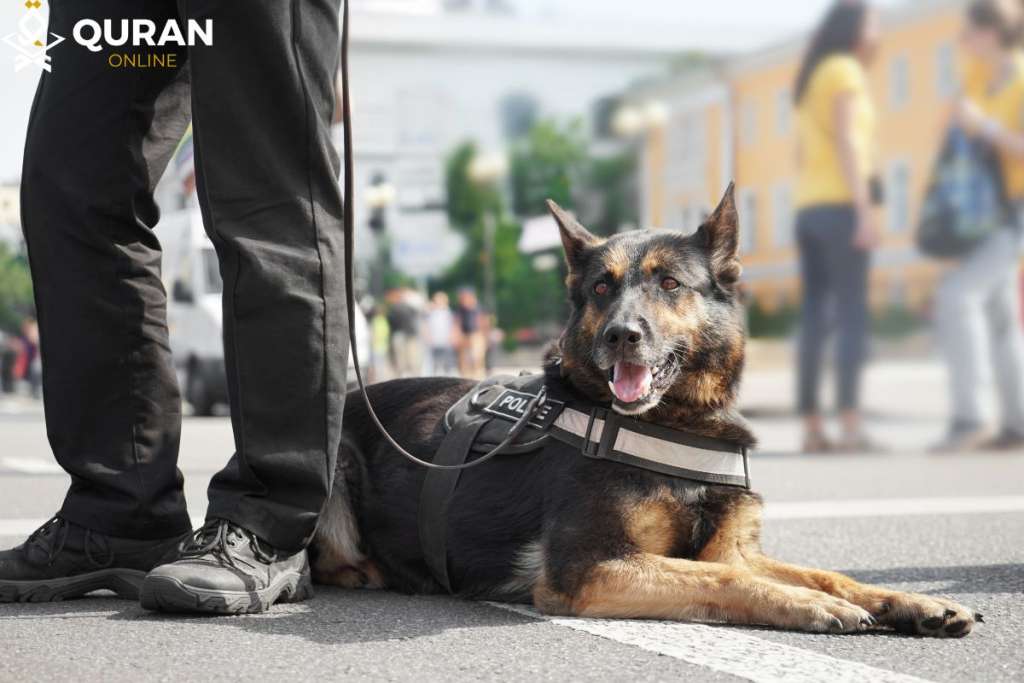
In Islam you’re allowed to keep a guard dog because the prophet (peace and blessings of Allah be upon him) said that dogs are allowed for hunting, guarding livestock, and guarding crops.
The Prophet (peace and blessings of Allaah be upon him) said: “Whoever keeps a dog, his reward for good deeds will decrease by one Qeeraat every day, except dogs used for farming or herding livestock.” [Narrated by al-Bukhaari, 2322.]
There are two views regarding whether it’s allowed to have a dog for protection or not. The first view states that keeping a dog is only permitted for farming, hunting, and herding, and guarding the house is not one of the three exceptions.
The second view states that having a dog for protection is permissible because the hadith shows that it’s allowed to keep a dog when necessary.
al-Nawawi (may Allah have mercy on him) said that keeping a dog to guard a house is not haram and classed the second view as saheeh. Also, Shaykh Ibn Uthaymeen (may Allah have mercy on him) classed the second view as saheeh and said:
“The correct view is that it is permissible to keep a dog to guard the house because if it is permissible to keep a dog in order to benefit from it, as in the case of hunting, it is more appropriate that one be allowed to keep a dog in order to ward off harm and protect oneself.”
What dog breeds can make good guard dogs?
Any dog that is calm, friendly with anyone, and has low-energy breeds are bad for protection. As they will ignore strangers or play with them. Here are the best 9 dogs that make good guard dogs:
- German Shepherd
- Akita
- Belgian Malinois
- Bullmastiff
- Cane Corso
- Doberman Pinscher
- Pit Bull
- Rhodesian Ridgeback
- Rottweiler
Some of these dogs are better as guard dogs than others. For example, German Shepherds are usually the easiest to train but they are not the strongest, while dogs like Pit Bulls make for stronger guard dogs but their stubborn and aggressive nature make them more difficult to train, especially if you are inexperienced in dog training.
The responsibilities of keeping a guard dog as a Muslim.
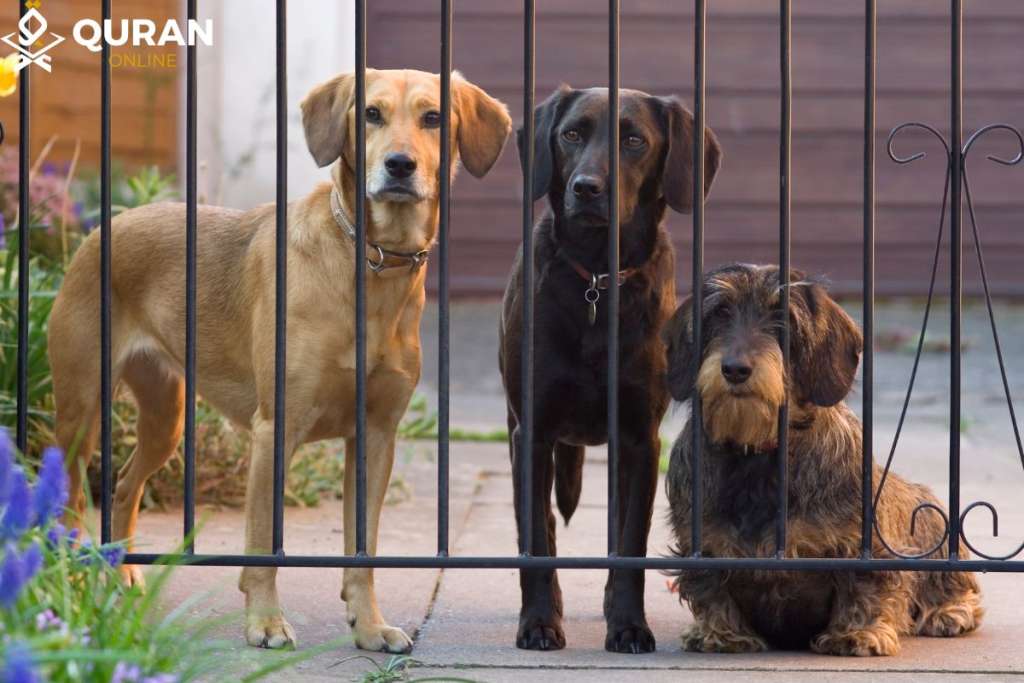
You should take care of your dog in the way that you should take of any living being in your family. Taking care of the dog is a responsibility more like taking care of a child than it is taking care of a property.
Abu Hurairah (May Allah be pleased with him) narrated that the Prophet (peace and blessing be upon him) said,
“While a man was walking on his way, he became extremely thirsty. He found a well, he went down into it to drink water. Upon leaving it, he saw a dog that was panting out of thirst. His tongue was lolling out and he was eating moist earth from extreme thirst.
The man thought to himself: ‘This dog is extremely thirsty as I was. So, he descended into the well, filled up his leather sock with water, and holding it in his teeth, climbed up and quenched the thirst of the dog. Allah appreciated his action and forgave his sins”.
The Companions asked: “Shall we be rewarded for showing kindness to the animals also?” the prophet (peace and blessing be upon him) said, “A reward is given in connection with every living creature”
[Al-Bukhari and Muslim]
The Prophet (peace be upon him) said,
“A woman entered the (Hell) Fire because of a cat which she had tied. She neither gave it food nor set it free to eat from the vermin of the earth.”
[Sahih al-Bukhari 3318, Book 59, Hadith 124, Vol. 4, Book 54, Hadith 535]
From the above hadiths, we understand that we should be kind to animals, and not to harm them. Therefore, as a Muslim keeping a guard dog you should feed the dogs, be kind to them, play with them, and take care of them.
But what about walking them? is dog walking haram? No dog walking isn’t haram and you should walk them. However, you shouldn’t get in contact with their saliva, why? you can learn more about it in, is it haram to play with a dog?
Should you breed or neuter your guard dog as a Muslim?
You might be wondering, is it haram to breed and sell dogs? There’s a fatwa that states the following when it comes to breeding or neutering your guard dog as a Muslim:
Buying, selling, and breeding dogs that can help in criminal investigations and in other matters that bring benefit to people is permissible. However, breeding dogs as a matter of extravagance or blind imitation is in no way accepted.
Does Touching a Dog Break Wudu?
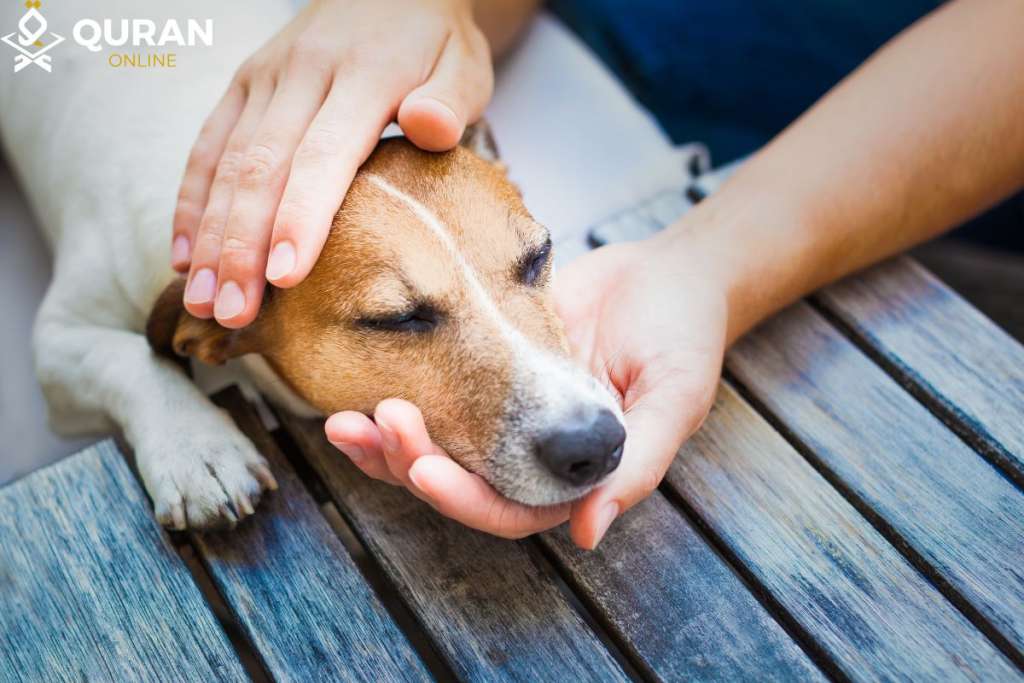
Many people wonder, is dog haram to touch, if they touch their dogs should they perform wudu? And the answer is no, touching a dog will not break your wudu and it’s not haram.
There is no evidence in Shari`ah that touching a dog breaks the wudu. The things that nullify wudu are only the things knowing in Shari`ah.
Touching dogs or their saliva doesn’t break the wudu. Ibn Qudamah mentioned in al-Mughni (1/264) the things that nullify wudu and dogs are not of them.
He said:
“These are all the things that nullify taharah, and it cannot be nullified by anything else according to the view of the majority of scholars. But there is no doubt that a dog’s saliva is very dirty and extremely impure, and it can only be removed by washing seven times, one of them with earth. There is a difference between this and something which nullifies taharah.”
Can you raise dogs inside the house?
Raising a dog inside the house is not permissible for Muslims. Muslims are allowed to raise dogs only for hunting, guarding livestock, or guarding crops outside the house.
Ibn Maajah (3640) narrated from ‘Ali ibn Abi Taalib (may Allah be pleased with him) that the Prophet (peace and blessings be upon him) said: “The angels do not enter a house in which there is a dog or an image.” [Classed as saheeh by al-Albaani in Saheeh Ibn Maajah.]
Al-Bukhaari (2145) narrated that Abu Hurayrah (may Allah be pleased with him) said: The prophet (peace and blessings be upon him) said: “Whoever keeps a dog, a Qiraat from his good deeds will be deducted every day, except a dog for farming or herding livestock.”
Muslim (2978) narrated from Abu Hurayrah (may Allah be pleased with him) that the Prophet (peace and blessings of Allah be upon him) said: “Whoever keeps a dog that is not a dog for hunting, herding livestock or farming, two Qiraats will be deducted from his reward each day.”
From the above hadiths, we understand that we can have a dog for protection but we can’t raise them in the house, they should be kept in a separate place.
You might also ask yourself, do dogs go to heaven in Islam? and you can read the article to know more about it.
Are dogs impure?
No dogs are not impure. Some people believe that keeping a dog is Najis because the dog itself is impure which is wrong. The impurity isn’t in the dog itself but in its saliva, therefore a person should not get in contact with the dog’s saliva.
Does touching or kissing a dog require purification?
Touching or kissing a dog doesn’t require purification. The things that nullify wudu are only the things knowing in Shari`ah, and touching a dog isn’t one of them. So, when touching your dog, you don’t need to purify yourself with soil or water.
The hadith mentions that one should purify the vessel from which the dog drinks or licks if you want to use it, but it doesn’t say anything about purifying yourself. Additionally, if the vessel is for the dog and you won’t use it then you don’t have to purify it with water and soil.
If you have a sick dog there are some dua to recite which you will find here, dua for a sick dog.
It was narrated from Abu Hurayrah (may Allah be pleased with him) that the Prophet (peace and blessings of Allah be upon him) said: “The purification of the vessel of one of you if a dog licks it, is to wash it seven times, the first time with soil.” [Nararted by Muslim, 279.]
And according to another report by Muslim (280): “If a dog licks the vessel of one of you, let him wash it seven times and rub it with soil the eighth time.”
Shaykh Ibn Taymiyah (may Allah have mercy on him) said: “With regard to dogs, there are three views among the scholars:
- That they are tahir (pure), even their saliva. This is the view of Malik.
- That they are najis (impure), even their hair. This is the view of al-Shafi’i and is one of the two views narrated by Ahmad.
- Their hair is tahir but their saliva is najis. This is the view of Abu Haneefah and of Ahmad in the other report narrated from him.
This is the most correct view. So if the wetness of the dog’s hair gets onto one’s garment or body, that does not make it najis.” [Majmu’ al-Fatawa, 21/530.]
He also said: “That is because the basic principle is that substances are tahir, and it is not permissible to regard anything as najis or haram without evidence, as Allah says in the holy Quran:
“while He has explained to you in detail what is forbidden to you, except under compulsion of necessity?” [al-An’am 6:119]
“And Allah will never lead a people astray after He has guided them until He makes clear to them as to what they should avoid” [al-Tawbah 9:115]
The Prophet (peace and blessings of Allah be upon him) said:
“The purification of the vessel of one of you, if a dog licks it, is to wash it seven times, the first time with soil” – and in another hadith, “If a dog licks a vessel…” All of the ahadith mention licking only; they do not mention any other part of the dog, and regarding them as najis is based only on analogy.
Moreover, the Prophet (peace and blessings of Allah be upon him) granted a concession allowing people to keep dogs for hunting, herding, and farming. The one who keeps them must touch the wetness of their hair, just as happens in the case of mules, donkeys, etc. To suggest that their hair is najis when touching them cannot be avoided could impose an undue hardship, which is not what the Lawgiver intended for this ummah.” [Majmu’ al-Fatawa, 21/217, 218]
Shaykh Ibn ‘Uthaymin said:
“With regard to touching this dog, if there is no wetness then it does not make the hand najis, but if he touches it and there is any wetness, then this means that the hand becomes najis according to the view of many scholars, and the hand must be washed after that seven times, one of which should be with soil.” (Majmu’ Fatawa Ibn ‘Uthaymin, 11/246)
Just to be sure you better wash your hands seven times if there is something wet on your hands or if there’s something wet on the dog.
Conclusion.
Muslims are allowed to have dogs for protection, hunting, guarding livestock, and guarding crops, but they are not allowed to keep them for fun or as a pet. As the Prophet (peace and blessings of Allah be upon him) said: “Whoever keeps a dog, his reward for good deeds will decrease by one Qeeraat every day, except dogs used for farming or herding livestock.” [Narrated by al-Bukhaari, 2322.]
We also discussed that you don’t have to purify yourself when touching your dog or performing Wudu because the dog itself isn’t impure.
That’s the end of today’s article, I hope you found it useful, and for more visit our website QuranOnline.com
If you found this article helpful, please share it. If you have any questions or comments, please drop us a comment below and we’ll be more than ready to help you.


